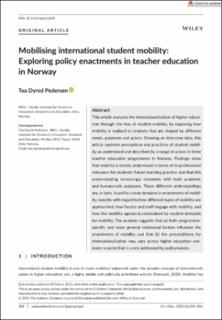Mobilising international student mobility: Exploring policy enactments in teacher education in Norway
Peer reviewed, Journal article
Published version
Permanent lenke
https://hdl.handle.net/11250/3016534Utgivelsesdato
2021Metadata
Vis full innførselSamlinger
Originalversjon
10.1111/ejed.12451Sammendrag
This article analyses the internationalisation of higher education through the lens of student mobility, by exploring how mobility is realised in contexts that are shaped by different needs, purposes and actors. Drawing on interview data, this article explores perceptions and practices of student mobility as understood and described by a range of actors in three teacher education programmes in Norway. Findings show that mobility is mainly understood in terms of its professional relevance for students’ future teaching practice, but that this understanding increasingly competes with both academic and bureaucratic purposes. These different understandings are, in turn, found to create tensions in enactments of mobility, notably with regard to how different types of mobility are approached, how faculty and staff engage with mobility, and how the mobility agenda is constrained by student demands for mobility. The analysis suggests that (a) both programme‐specific and more general contextual factors influence the enactments of mobility and that (b) the preconditions for internationalisation may vary across higher education contexts—a point that is rarely addressed by policymakers. Mobilising international student mobility: Exploring policy enactments in teacher education in Norway
